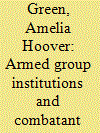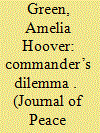|
|
|
Sort Order |
|
|
|
Items / Page
|
|
|
|
|
|
|
| Srl | Item |
| 1 |
ID:
155201


|
|
|
|
|
| Summary/Abstract |
Ex-combatants who fought with the Salvadoran Army during El Salvador’s 1980–92 civil war often recall being ‘captured’, rather than recruited, suffering beatings and humiliation in the course of training, and fighting without a sense of purpose or direction. Those who served with rebel forces, by contrast, recall fatigue and frustration with new routines, but seldom hazing or abuse; most also recalled deep, ongoing instruction about the purpose and goals of the war. This comparison highlights the broad variation in armed groups’ formal institutions for socialization, a topic that political scientists have only recently begun to examine in depth. The Salvadoran case also emphasizes some shortcomings of the existing literature, which may elide the differing effects of different formal institutions, treat individual institutions as operating independently on combatant behavior, and/or fail to map complex causal processes intervening between institutions and behavior. This article takes as its starting point the observation that many armed group institutions – including recruitment, military training, political training, and disciplinary regimes – are components of the process known more generally as ‘combatant socialization’. Examining specific institutional processes associated with combatant socialization allows for the generation of more refined and specific theories of combatant socialization as both a causal variable and an outcome. At the same time, treating armed group institutions as related elements of a broader process, rather than as fully separate institutions, may also advance understandings of the effects of these institutions. I demonstrate that the implementation and content of formal institutions for socialization varied significantly both across and within groups in El Salvador; building on this analysis, I lay out several potential directions for comparative research.
|
|
|
|
|
|
|
|
|
|
|
|
|
|
|
|
| 2 |
ID:
147832


|
|
|
|
|
| Summary/Abstract |
This article proposes a framework for understanding variation in armed groups’ abilities to control wartime violence, including violence against civilians. I argue that patterns (both levels and forms) of violence are shaped by armed group leaders’ attempts to meet two conflicting imperatives. To succeed, commanders must build a fighting force capable of swift, unhesitating violence; they must also maintain some control over the level, form(s), and targeting of violence. I refer to this situation as the Commander’s Dilemma. Drawing on literatures from psychology and sociology, I argue that effective behavioral control cannot be achieved via extrinsic incentives (i.e. pecuniary or non-pecuniary rewards and punishments) alone. Rather, effective control of combatant violence depends upon armed group institutions intended to align combatants’ preferences with those of commanders. I therefore focus analytically on political education, the armed group institution most likely to operate in this way. In particular, I hypothesize that armed groups with strong and consistent institutions for political education should display, on average, narrower repertoires of violence than those without. This argument finds preliminary support in a cross-national analysis of reported rape by rebel forces, as well as a qualitative investigation of armed groups during civil war in El Salvador. More broadly, this approach suggests that the creation of restraint is at least as important to our understandings of wartime violence as the production of violence.
|
|
|
|
|
|
|
|
|
|
|
|
|
|
|
|
| 3 |
ID:
113939


|
|
|
|
|
| Publication |
2012.
|
| Summary/Abstract |
Transnational advocacy organizations are influential actors in the international politics of human rights. While political scientists have described several methods these groups use - particularly a set of strategies termed 'information politics' - scholars have yet to consider the effects of these tactics beyond their immediate impact on public awareness, policy agendas or the behavior of state actors. This article investigates the information politics surrounding sexual violence during Liberia's civil war. We show that two frequently-cited 'facts' about rape in Liberia are inaccurate, and consider how this conventional wisdom gained acceptance. Drawing on the Liberian case and findings from sociology and economics, we develop a theoretical framework that treats inaccurate claims as an effect of 'dueling incentives' - the conflict between advocacy organizations' needs for short-term drama and long-term credibility. From this theoretical framework, we generate hypotheses regarding the effects of information politics on (1) short-term changes in funding for human rights advocacy organizations, (2) short-term changes in human rights outcomes, (3) the institutional health of humanitarian and human rights organizations, and (4) long-run outcomes for the ostensible beneficiaries of such organizations. We conclude by outlining a research agenda in this area, emphasizing the importance of empirical research on information politics in the human rights realm, and particularly its effects on the lives of aid recipients.
|
|
|
|
|
|
|
|
|
|
|
|
|
|
|
|
|
|
|
|
|